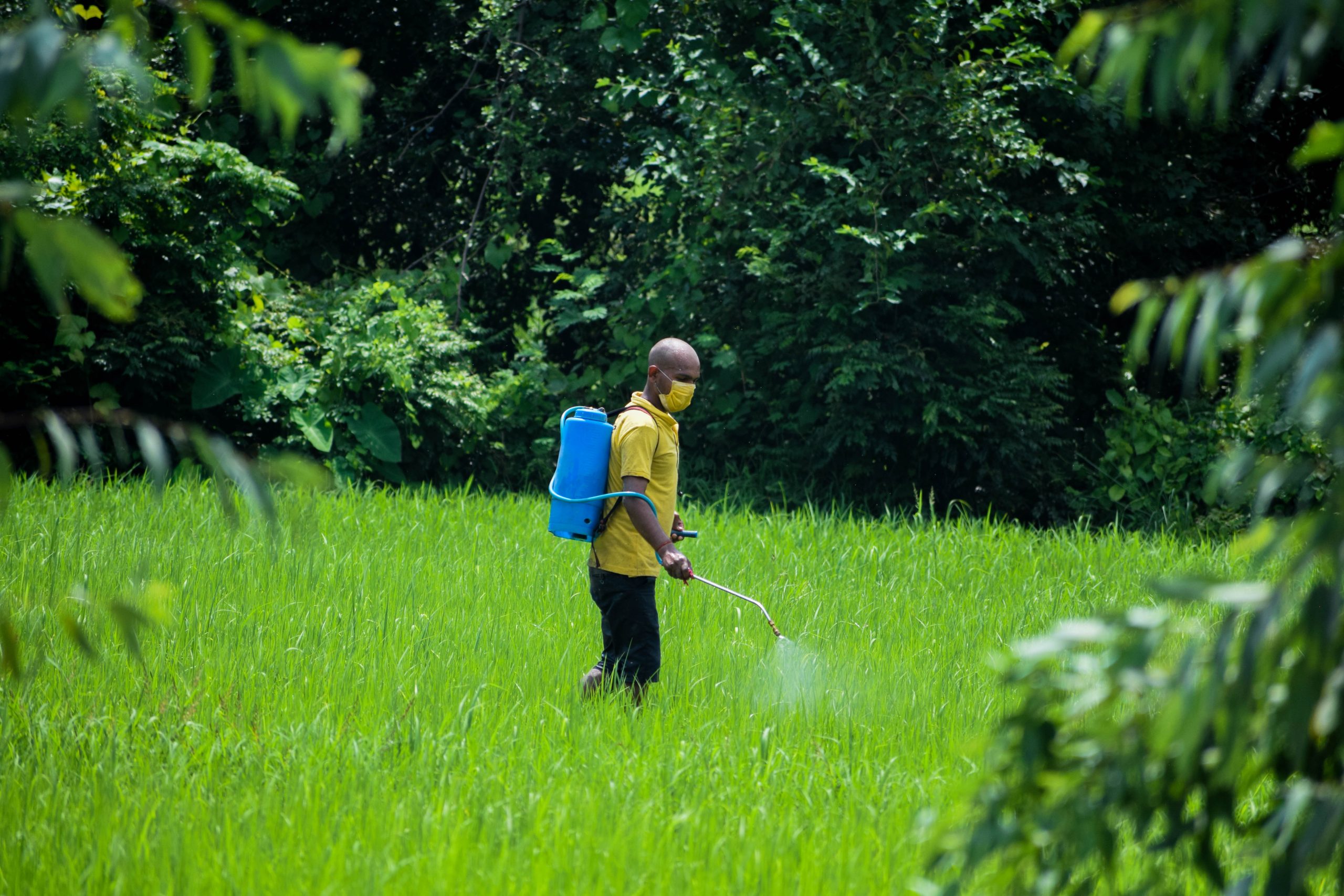Glyphosate is the most widely used herbicide in the world. It is also a key ingredient in many popular weedkillers, such as Roundup. It is used by farmers, homeowners, and landscapers to control weeds in various settings.
While it effectively kills weeds, there is growing concern about its potential health risks. The World Health Organization (WHO) has classified it as “probably carcinogenic to humans.”
Also, as indicated by numerous studies, exposure to this chemical is linked to cancer, liver/kidney damage, reproductive issues, and neurological disorders. In this article, we will explore the potential dangers of glyphosate and offer tips for reducing exposure to this herbicide.
Glyphosate: A Common Weedkiller
Glyphosate, a broad-spectrum herbicide, has become a staple in modern agriculture and gardening. Initially introduced by Monsanto in the 1970s under the brand name Roundup, it quickly gained popularity due to its efficiency in eliminating unwanted vegetation.
Its broad applicability made it a favored tool for farmers and gardeners, offering an easy and cost-effective solution for weed control. The Guardian reports that US farmers applied over 200 million pounds of glyphosate on genetically engineered crops like soybeans and corn annually. It disrupts the metabolic pathways in plants, ultimately leading to their demise.
The chemical is available in various formulations, including liquids, granules, and powders. It is typically applied to plants using a sprayer. It is generally considered safe for humans when used according to label directions. However, there is some concern about the potential health risks of long-term exposure to it.
Glyphosate Exposure and Personal Health
Exposure to this chemical occurs through various avenues. Occupational exposure primarily affects farmers and agricultural workers, frequently using herbicides that include this chemical. Environmental exposure can stem from its presence in air, water, and soil. It can affect those who breathe polluted air, consume tainted water, or ingest contaminated food.
Home and garden use of these herbicides also presents risks for individuals seeking to maintain their lawns and gardens.
The health effects vary depending on the level of exposure and the duration. People exposed to high levels of glyphosate are at an increased risk of developing cancer and other health problems.
TorHoerman Law states that it has been associated with several health issues. These include endocrine disruption, kidney and liver disease, microbiome disruption, neurotoxicity, and the potential link to ALS (Lou Gehrig’s disease).
These concerns highlight the multifaceted and evolving nature of the health risks associated with Roundup exposure. These mounting concerns surrounding the exposure have spurred widespread public awareness and a wave of legal action. Individuals who claim to have suffered health issues have filed Roundup lawsuits against the manufacturers.
Also, manufacturers have agreed to pay billions of dollars as a settlement to resolve thousands of Roundup lawsuits. The Roundup lawsuit payouts and settlement amounts have proved vital for the victims seeking to enhance their quality of life after vulnerability.
The Roundup settlement amounts are contingent upon several factors, including:
- the strength of the plaintiff’s case,
- the quality of evidence presented,
- the severity of the injury or illness,
- the extent of required medical treatment and
- the sought-after damages.
On average, it is estimated that the Roundup settlement amounts would typically range from $5,000 to over $200,000.
Environmental Impact
One of its biggest environmental concerns is its impact on soil health. It can kill beneficial soil microbes, leading to poor soil fertility and erosion. It can also contaminate groundwater, and it can harm aquatic life.
Another concern is that it can lead to the development of herbicide-resistant weeds. It is because it kills weeds by targeting an enzyme that is essential for plant growth. However, some weeds can develop mutations that make them resistant to the chemical.
It also can leach into groundwater and surface water. For example, a report by PAN Europe and the Greens/EFA Group in the European Parliament reveals pervasive pollution. The report revealed that glyphosate and AMPA contaminate surface waters in 11 of 12 European countries year-round. This widespread contamination poses a significant threat to aquatic life and financial burdens on European water companies.
The data also underscores the urgency of considering alternative, more environmentally friendly approaches to weed control.
Legal and Regulatory Aspects
The legal and regulatory aspects of glyphosate are complex and vary from country to country.
In the United States, it is regulated by the Environmental Protection Agency (EPA). In contrast to the WHO’s study, the EPA has classified it as “not likely to be carcinogenic to humans.” However, the EPA is currently reviewing the safety of the pesticide in light of new scientific evidence.
Also, the European Union renewed it for a few years, but it also reduced the maximum residue levels on food and feed. The European Parliament passed a resolution to prohibit the use of this pesticide in public areas. However, this proposal faced rejection by the European Council.
In response to environmental concerns, several countries have restricted this chemical. According to Phys.org, France, the Netherlands, and Belgium banned it for household use. Meanwhile, Germany has prohibited its use in public areas and is set to enforce a complete ban by 2023.
It is important to stay informed about the latest developments so you can make informed decisions about your vulnerability.
Personal Protection and Alternatives
If you’re concerned about the potential health risks associated with pesticide exposure, there are several proactive steps for yourself and your family. Firstly, avoid using this herbicide on your lawn and garden and opt for safer alternatives like organic herbicides. If its usage is necessary, adhere to safety instructions on the label. It is better to wear protective clothing and apply it on calm days to prevent drift.
After use, wash your hands thoroughly. Before consuming, ensure a thorough wash of fruits and vegetables to eliminate any potential residue. Supporting farmers practicing sustainable agriculture and advocating for policies that restrict chemical use are vital steps toward a safer environment.
Through protective measures and eco-friendly alternatives, individuals can prioritize well-being and minimize glyphosate’s environmental footprint.
Public Awareness and Advocacy
As concerns about glyphosate’s potential dangers continue to grow, so does public awareness and advocacy surrounding the herbicide. Individuals and organizations worldwide are taking action to shed light on the risks and push for more responsible use of glyphosate-based herbicides.
Through the power of information sharing, awareness of the potential hazards has reached new heights. Media coverage, documentaries, and grassroots movements have played a significant role in educating the public about the herbicide’s impact on health and the environment.
Also, advocacy groups and environmental organizations have been instrumental in calling for tighter regulations and pushing for safer alternatives. Legal actions, petitions, and lobbying have become common tools in the fight to protect personal health and the planet.
Final Words
As this article illuminates, glyphosate’s reach extends far beyond the realm of weed control. It extends to environmental health, agricultural sustainability, and individual choices for self-protection and planet preservation.
To address these concerns, adopting protection, using eco-friendly methods, and supporting green practices are crucial steps. Glyphosate lingers, but our decisions mold its effects on well-being and Earth’s health. Personal protection, eco-friendly alternatives, and environmental support matter.
Also Read: Apple Cider Vinegar: 6 Remedies for your Well-being

